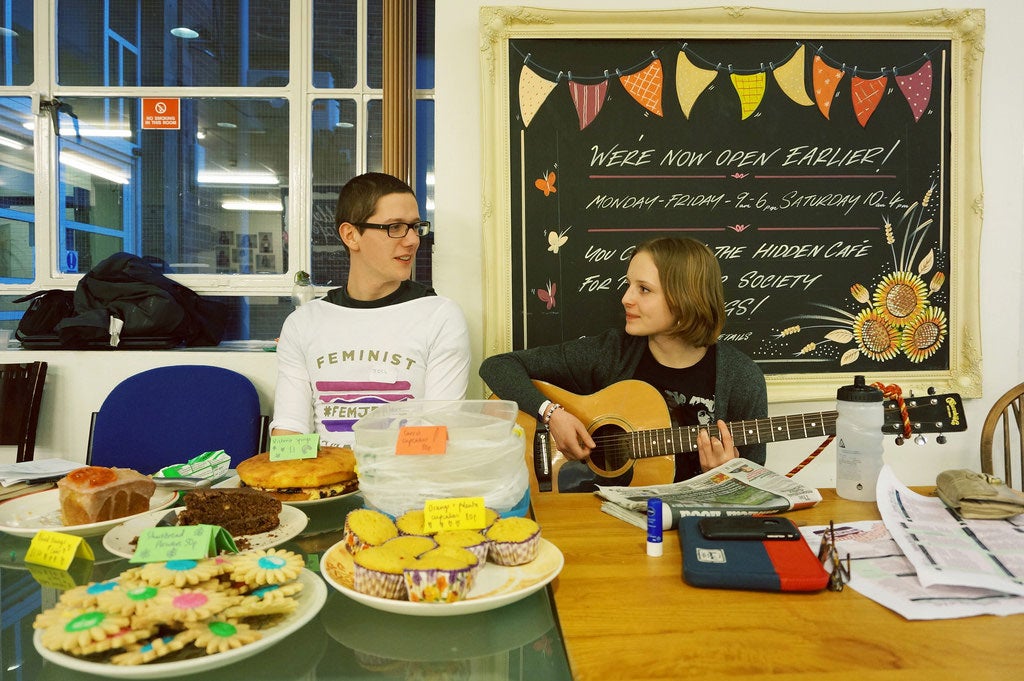Student Feminist Jamboree 2014: Taking student feminism forward

Your support helps us to tell the story
From reproductive rights to climate change to Big Tech, The Independent is on the ground when the story is developing. Whether it's investigating the financials of Elon Musk's pro-Trump PAC or producing our latest documentary, 'The A Word', which shines a light on the American women fighting for reproductive rights, we know how important it is to parse out the facts from the messaging.
At such a critical moment in US history, we need reporters on the ground. Your donation allows us to keep sending journalists to speak to both sides of the story.
The Independent is trusted by Americans across the entire political spectrum. And unlike many other quality news outlets, we choose not to lock Americans out of our reporting and analysis with paywalls. We believe quality journalism should be available to everyone, paid for by those who can afford it.
Your support makes all the difference.For many, 2013 was the "Year of the Feminist". Throughout last year, from high-end fashion magazines to tabloid papers; on the television, on the radio, and in the deepest darkest depths of the blogosphere; in books, in the cinema and all over social media; columnists, journalists and other writers on the left, right and centre paid homage to a “rebirth of feminism”. Some even went so far as to suggest that the movement had entered a “fourth wave”.
While the mainstream media’s fixation with feminism in 2013 could (and should) be criticised for its narrow focus on groups and actions that were predominantly young, white and student-led, there were indeed a huge number of successful and varied feminist campaigns during those twelve months. It was the year that we said “yes” to Jane Austen on our £10 notes, “no” to airbrushing her portrait when it eventually appears on them, and threatened to boycott Twitter for failing to respond to rape threats waged against the campaign’s founder. We started to question which celebrities identified as feminists, and got upset when they said they were not.
Like it or loathe it, the No More Page 3 campaign continued to take the country by storm, with almost 30 universities deciding to remove The Sun from shelves by the end of the year. Also challenged at campuses nationwide was Robert Thicke’s dubious number one “hit”, Blurred Lines. Back in the wider world, women’s groups such as Southall Black Sisters took to the streets to protest against injustices within local communities. The Everyday Sexism Project retained its position in our headlines and our hashtags, and we adopted a few more for good measure as well (see: #NotYourAsianSidekick, #SolidarityIsForWhiteWomen and #MyFeminismLooksLike).
And it was during 2013 that the idea for Feminist Jamboree, a national student conference in Leeds, was first conceived. The event was organised and coordinated by volunteers from Leeds University's feminist society, and on 8-9 February 2014, hundreds of students from universities and colleges across the United Kingdom travelled to Yorkshire for the conference. The programme encompassed a range of contemporary intersectional feminist ideas and debates, and took months of intensive planning, as Jacob Mirzaian explains: “In all honesty, we had no idea how much work it would be. But in the end, the conference was a huge success because we could fall back on the friendships and communication we had built over years in Leeds University Union FemSoc and the national network [National Feminist Student Supergroup UK] which we started building in 2009.”
The Feminist Society at Leeds University Union received national media coverage itself last year following its successful campaign against Tequila UK, a nightclub event which allegedly glorified rape in a promotional video. Freya Potter, who coordinated much of the campaign, was one of the participants at the conference. Following her presentation on the campaign and tackling misogyny in the community in general, she told The Independent: “It was great to share our campaign experience with other feminists, and I hope that other student groups will use what we discussed at FemJam to tackle misogynistic culture in their own cities and universities”.
A celebration of all things feminist, the weekend also included an afterparty, at which London-based poet Megan Beech performed. Speaking to The Independent about the significance of the student conference and the ideas discussed regarding “contemporary feminism”, Megan explained: “So much misogyny (and the fight against it) is happening online, on social networking sites. Whilst that’s a fantastic way of engaging wider audiences, establishing face-to-face discussion and debate is still integral to the success of feminist activism, and events such as Student Feminist Jamboree enable that.”
Bringing together students, activists and academics from throughout the country and beyond, the conference covered a range of issues within feminism and activist groups. As well as representatives from student bodies such as the NUS, organisations and individuals including English Collective of Prostitutes and Chella Quint participated in the event, ensuring it fulfilled its inclusive and collaborative ambitions.
The weekend demonstrated that there are indeed plenty of reasons to celebrate feminism in 2014, and there were lots of reasons to write about it last year as well. It reminded us that despite what we might have read last year, feminism and women’s activism in general never really went away; it was the networks created through years of activism that enabled the conference to take place when it did. Feminism might be a trendy word at the moment, but it also carries powerful ideas, which have and will continue to shape and inspire my generation and our society for years to come.
Join our commenting forum
Join thought-provoking conversations, follow other Independent readers and see their replies
Comments